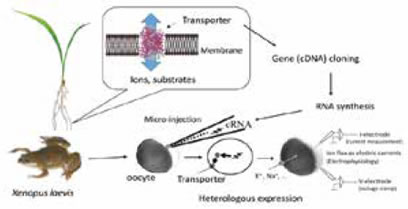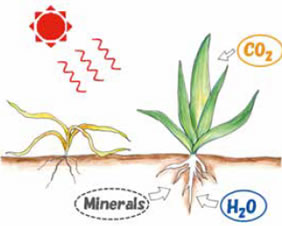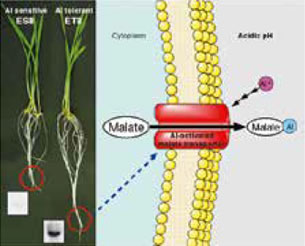Research Area : Plant Molecular Physiology
Water and ion transport in plants under salinity stress
Salinity stress is one of major abiotic stress that limit plant productivity in global agriculture. Salinity, usually high concentration of Na+, reduces water and mineral uptake in plant. I study root hydraulic conductivity (Lpr) using the root pressure chamber method, because regulation of Lpr is important to prevent dehydration and to cope with osmotic imbalance in initial phase of salinity stress. As for plant ion transporters, cRNAs are injected into a frog Xenopus oocytes and their properties (ion selectivity and activation mechanism) are investigated electrophysiologicaly to reveal what and how transporters regulate ion flux under salinity stress.

Aquaporins transporting water and low-molecular weight compounds
Aquaporins was first identified as a membrane protein exhibiting permeability for water when faced with an osmotic gradient. Now it is reported that several aquaporins facilitate the transport of not only water but also other low-molecular weight substrates such as glycerol, ammonia, silicic acid, arsenite, boric acid, and carbon dioxide. I study rice and barely aquaporins to improve plant growth and stress tolerance via aquaporin functions.

Research on function and structure of plant-specific malate transporters
Aluminum (Al) ion is a major inhibitory factor of plant growth in acidic soils which comprise almost 40% of the world arable land. Toxic Al cations (Al3+) rapidly inhibit root growth and prevent subsequent uptake of water and nutrients. The mechanisms of Al toxicity and tolerance are analyzing using a cultured cell system and whole plants. Especially Al-tolerance mechanism, wheat ALMT1 gene encoding Al-activated malate transporter was found by our group, and demonstrated as Al-tolerant as well as acidic-soil tolerant gene, for the first time in crops. In addition, since the ALMT gene and its homologues have been found only in plants, the diversity of physiological functions for individual ALMT genes was elucidated as recent studies. The molecular details of the structure and functions and the expression mechanisms of these transporters are now studied.

A gene encoding aluminum (Al)-activated malate transporter (ALMT1) regulates Al tolerance of wheat.
It was previously shown that Al tolerance in wheat (Triticum aestivum L.) is correlated with the Al-activated efflux of malate which chelates and detoxifies Al cations around root apices. To isolate the gene involved in this mechanism, Sasaki et al. (2004, Plant J.) examined a pair of near-isogenic wheat lines that differed in Al tolerance at a single genetic locus, and found a gene which shows greater expression in the root apices of ET8 (the Al-tolerant line) than that of ES8 (the sensitive line), as depicted in the photograph. The gene is named ALMT1 which encodes a novel transporter protein facilitating the Al-activated efflux of malate and is a major Al-tolerant gene of wheat.



